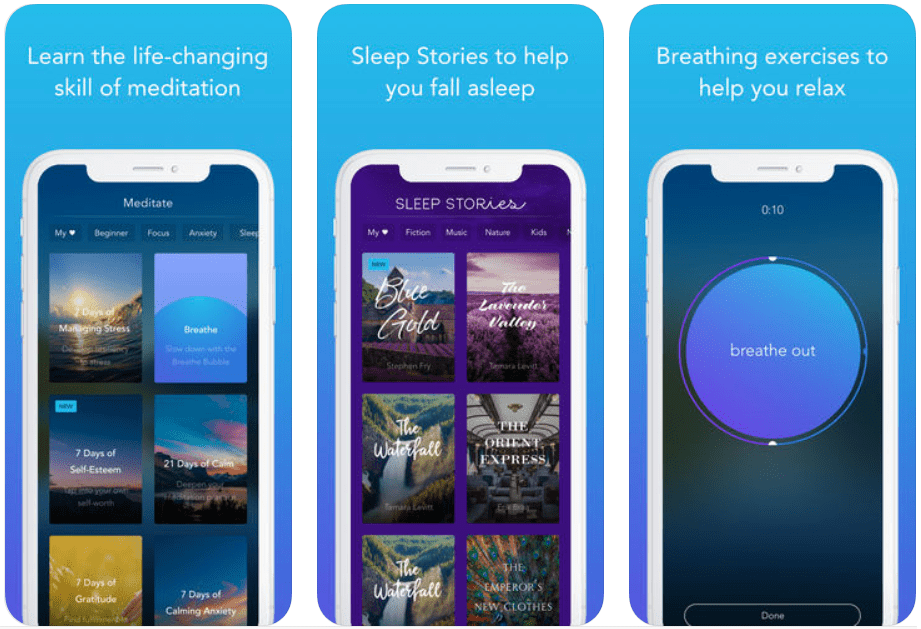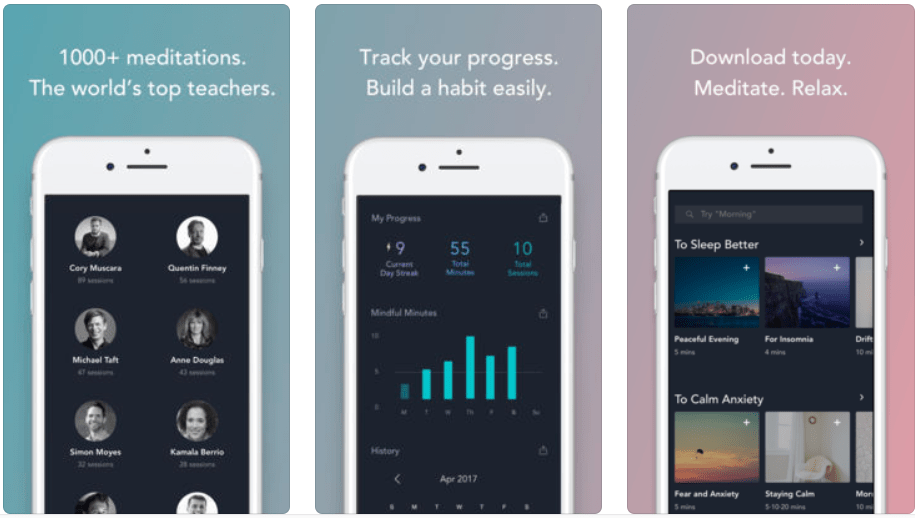Sleep meditation apps are gaining popularity as people seek ways to improve their sleep quality. These apps offer a range of features, from guided meditations to sleep stories, that can help users relax and drift off to sleep.
In this article, we’ll explore the market landscape for sleep meditation apps, discuss their features and functionality, and provide tips on how to choose the best app for your needs.
App Market Overview
The global sleep meditation app market is experiencing rapid growth, driven by increasing awareness of mental health and well-being. The market is highly competitive, with a range of established players and emerging innovators offering diverse solutions.
Key players in the market include Calm, Headspace, Insight Timer, and Sleep Cycle. Calm holds a significant market share, with over 100 million downloads and a loyal user base. Headspace is another major player, known for its guided meditation sessions and mindfulness programs.
Insight Timer offers a vast library of free and paid content, including guided meditations, sleep stories, and music.
Emerging Trends and Innovations
Emerging trends in the sleep meditation app industry include the integration of artificial intelligence (AI) and personalized recommendations. AI-powered apps can track user data, such as sleep patterns and meditation habits, to provide tailored experiences and recommendations. Personalized recommendations help users discover content that is most relevant to their needs and preferences.
App Features and Functionality

Sleep meditation apps offer a range of features to help users relax, fall asleep, and improve their overall sleep quality. These features include:
- Guided meditations: Guided meditations are led by a narrator who provides instructions on how to relax the body and mind. These meditations can be tailored to specific needs, such as falling asleep, reducing stress, or improving focus.
- Sleep sounds: Sleep sounds are recordings of ambient noises, such as rain, waves, or white noise. These sounds can help to block out distracting noises and create a relaxing atmosphere for sleep.
- Sleep tracking: Sleep tracking features allow users to monitor their sleep patterns and identify areas for improvement. These features can track metrics such as sleep duration, sleep quality, and wake-up times.
- Dream journaling: Dream journaling features allow users to record and interpret their dreams. This can help users to gain insights into their subconscious mind and identify any underlying issues that may be affecting their sleep.
In addition to these common features, some sleep meditation apps also offer innovative features that differentiate them from competitors. These features include:
- Personalized recommendations: Some apps use artificial intelligence to provide personalized recommendations for meditations and sleep sounds based on the user’s individual needs and preferences.
- Community support: Some apps offer community support features, such as forums and chat rooms, where users can connect with others and share their experiences.
- Integration with other health apps: Some apps integrate with other health apps, such as fitness trackers and sleep trackers, to provide a more comprehensive view of the user’s overall health and wellness.
These innovative features can help sleep meditation apps to stand out from the competition and provide users with a more personalized and effective experience.
App Design and User Experience

Sleep meditation apps prioritize user-friendliness and relaxation through their design. Visuals, navigation, and audio elements work together to create a calming and immersive experience.
Design choices significantly impact user engagement. Intuitive navigation reduces frustration, while soothing colors and calming sounds promote relaxation. Well-designed apps offer personalized experiences, tailoring content to individual needs and preferences.
Visual Design
- Soft, muted color palettes create a relaxing atmosphere.
- Minimalist interfaces minimize distractions and promote focus.
- High-quality imagery and animations evoke tranquility.
Navigation and Functionality
- Simple menus and clear navigation ensure easy access to content.
- Customization options allow users to personalize their experience.
li>Integration with other wellness apps enhances functionality.
Audio Design, Sleep meditation apps
- High-quality audio recordings enhance immersion and relaxation.
- Soothing music, nature sounds, and guided meditations create a calming ambiance.
- Adjustable volume and timer settings provide personalized control.
Well-Designed Apps
- Calm:Known for its minimalist design, guided meditations, and soothing soundscapes.
- Headspace:Offers a variety of meditation courses and exercises, with a user-friendly interface.
- Sleep Cycle:Analyzes sleep patterns and provides insights to improve sleep quality, with a simple and intuitive design.
App Content and Guidance
Sleep meditation apps offer a wide range of content to promote relaxation and improve sleep quality. These include:
Guided Meditations
- Guided meditations provide step-by-step instructions on how to relax and prepare for sleep.
- They often incorporate mindfulness techniques, body scans, and visualizations.
Sleep Stories
- Sleep stories are calming narratives designed to lull users to sleep.
- They typically involve soothing voices and gentle music, creating a relaxing and immersive experience.
Calming Music
- Calming music can help reduce stress and anxiety, promoting relaxation.
- Sleep meditation apps often offer a variety of music tracks, such as ambient sounds, nature sounds, and binaural beats.
The quality and variety of content are crucial for the effectiveness of sleep meditation apps. High-quality content is engaging, immersive, and effectively promotes relaxation. A wide range of content ensures that users can find options that suit their preferences and needs.
In addition to content, sleep meditation apps also provide guidance and support to users. This may include:
Personalized Recommendations
- Apps can track user preferences and offer personalized recommendations for meditations and other content.
- This helps users find the most effective content for their individual needs.
Progress Tracking
- Apps can track user progress over time, providing motivation and accountability.
- This helps users stay on track with their sleep meditation practice.
Community Support
- Some apps offer community forums or chat groups where users can connect with others.
- This provides a sense of support and shared experience, which can enhance the effectiveness of sleep meditation.
App Integration and Compatibility
Sleep meditation apps offer various integrations and compatibility options to enhance the user experience and provide a more personalized and holistic approach to sleep improvement.
These integrations allow users to connect their sleep meditation apps with other devices and platforms, enabling seamless data sharing and automated functionality.
Wearable Devices
Sleep meditation apps can integrate with wearable devices such as fitness trackers and smartwatches. This integration allows users to track their sleep patterns, heart rate, and other physiological data during sleep. The app can then provide personalized insights and recommendations based on the collected data.
Smart Home Assistants
Integration with smart home assistants like Amazon Alexa or Google Home enables users to control their sleep meditation sessions using voice commands. This hands-free functionality allows users to start, stop, or adjust their meditation sessions without having to physically interact with their devices.
Benefits and Limitations
The benefits of app integrations include:
- Enhanced personalization
- Automated data tracking
- Convenience and ease of use
However, there are also some limitations to consider:
- Compatibility issues between different devices and apps
- Potential privacy concerns
- Additional costs for premium features or device purchases
Examples of Successful App Integrations
Some successful examples of app integrations include:
- Headspace’s integration with Apple Health
- Calm’s integration with Fitbit
- Insight Timer’s integration with Amazon Alexa
App Pricing and Business Models
Sleep meditation apps employ various pricing models to monetize their services. These models include:
Subscription
Users pay a recurring fee (monthly, quarterly, or annually) for access to the app’s full range of features. This model provides a steady revenue stream and encourages long-term user engagement.
Freemium
Apps offer a basic set of features for free, with premium features available through in-app purchases. This model allows users to experience the app’s core functionality before committing to a paid subscription.
In-app purchases
Apps offer additional content or features (e.g., guided meditations, sleep tracking tools) as separate purchases within the app. This model allows users to customize their experience and purchase only the features they need.Factors influencing pricing strategies include:
App quality and features
The value and uniqueness of the app’s offerings determine its perceived worth and the price users are willing to pay.
Market competition
The pricing of similar apps in the market sets a benchmark for pricing decisions.
Target audience
The demographics, income level, and spending habits of the target audience influence pricing strategies.Pricing has a significant impact on app adoption and revenue generation:
Higher prices
May limit initial adoption but can generate higher revenue from dedicated users.
Lower prices
Can increase app downloads but may require a larger user base to achieve profitability.
Freemium models
Can attract a large user base but may face challenges in converting free users to paid subscribers.
App Marketing and Promotion
Effective promotion is essential for sleep meditation apps to reach their target audience and achieve success. Various marketing channels are employed to promote these apps, including:
- App Stores:Optimizing app listings in app stores (e.g., Apple App Store, Google Play) through relevant s and engaging descriptions can increase visibility and downloads.
- Social Media:Engaging with potential users on social media platforms (e.g., Facebook, Instagram, Twitter) by sharing valuable content, running contests, and collaborating with influencers can generate interest and drive app downloads.
- Content Marketing:Creating and distributing valuable content such as blog posts, articles, and videos that provide helpful information on sleep, meditation, and stress management can establish thought leadership and attract potential users.
- Paid Advertising:Utilizing paid advertising channels such as Google AdWords, Facebook Ads, and Instagram Ads can target specific audiences based on demographics, interests, and behaviors to promote the app and drive downloads.
- Email Marketing:Building an email list and sending targeted email campaigns to subscribers can nurture relationships, promote new features, and drive app usage.
To reach target audiences effectively, it is important to understand their needs, preferences, and demographics. Market research and user feedback can provide valuable insights into the target audience’s sleep patterns, pain points, and motivations. By tailoring marketing messages and content to resonate with the target audience, apps can increase engagement and conversions.
Successful marketing campaigns for sleep meditation apps often involve a combination of the above channels, tailored to the specific target audience. For example, the popular sleep meditation app Calm partnered with celebrities like LeBron James and Matthew McConaughey to promote its app through social media and content marketing, resulting in significant brand awareness and app downloads.
Outcome Summary

Sleep meditation apps can be a valuable tool for improving sleep quality. By providing users with a range of features and guidance, these apps can help people relax, reduce stress, and get a good night’s sleep.
Question Bank: Sleep Meditation Apps
What are the benefits of using sleep meditation apps?
Sleep meditation apps can help users relax, reduce stress, and improve sleep quality.
How do I choose the best sleep meditation app for me?
When choosing a sleep meditation app, consider your individual needs and preferences. Some factors to consider include the features offered, the cost, and the user reviews.
Are sleep meditation apps safe to use?
Yes, sleep meditation apps are generally safe to use. However, it’s important to choose a reputable app and to follow the instructions carefully.
